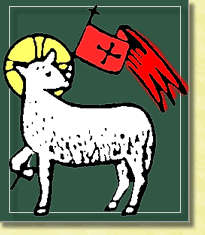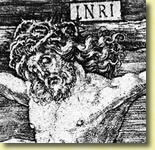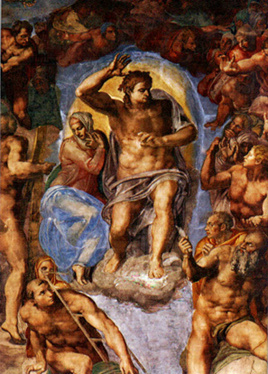Habakkuk 1:1-13: 2:1-4
Psalm 37
1 Timothy 1:1-14
Luke 17:5-10
 When I was a young man, the philosophy of existentialism was the main competition to Christian faith among secularists. The names of Jean Paul Sartre and Albert Camus were considered to offer the biggest challenge for Christians to address. Existentialism was even a theme in popular culture. When he first started out his career, Woody Allen’s movies were an outlet for existentialist themes. Existentialism seems to have fizzled out sometime in the early 1980’s, and in recent years it has been replaced by the New Atheism. Existentialists and the New Atheists have a lot in common, but also some considerable differences. Existentialists tended to be atheists, but they could also be agnostics. They tended to be neurotic. They wondered if life had meaning if there was no God. They tended to be nicer than the New Atheists. The New Atheists have no doubts. They don’t worry about whether life has meaning. They know that there is no God, and they’re angry at him for creating the world.
When I was a young man, the philosophy of existentialism was the main competition to Christian faith among secularists. The names of Jean Paul Sartre and Albert Camus were considered to offer the biggest challenge for Christians to address. Existentialism was even a theme in popular culture. When he first started out his career, Woody Allen’s movies were an outlet for existentialist themes. Existentialism seems to have fizzled out sometime in the early 1980’s, and in recent years it has been replaced by the New Atheism. Existentialists and the New Atheists have a lot in common, but also some considerable differences. Existentialists tended to be atheists, but they could also be agnostics. They tended to be neurotic. They wondered if life had meaning if there was no God. They tended to be nicer than the New Atheists. The New Atheists have no doubts. They don’t worry about whether life has meaning. They know that there is no God, and they’re angry at him for creating the world.
The single theme that unites the old existentialists and the New Atheists is the conviction that the evil and suffering that exists in the world makes it impossible to believe in a good and omnipotent God. At the end of Woody Allen’s movie Love and Death, his character says, “You know, if it turns out that there IS a God, I don’t think that He’s evil. I think that the worst you can say about Him is that, basically, He’s an underachiever.” The late Christopher Hitchens wrote a book entitled God is Not Great, but perhaps it really should have been titled God is not Good. Among other things, he writes in that book: “The Bible may, indeed does, contain a warrant for trafficking in humans, for ethnic cleansing, for slavery, for bride-price, and for indiscriminate massacre, but we are not bound by any of it because it was put together by crude, uncultured human mammals.”
Woody Allen certainly thought that he was being humorous in his quip about God being an underachiever, and I have no doubt that Christopher Hitchens thought his comments about the Bible and the kinds of people who wrote it was rather clever. If however, they thought that they were being original, that no one had ever expressed concerns about the goodness of God before, they were just a bit naïve, as we can find when we read the passage from this morning’s Old Testament lectionary passage from Habbukuk. Habbukuk looks at the world around him, and, in the light of what he sees expresses just as much concern about the goodness of God as does any twentieth century existentialist or twenty-first century New Atheist.
There is a common theme in Habbukuk and Psalm 37, which is why both are likely included in the readings this morning: Where is God when the unrighteous prosper, and the righteous are oppressed? The Psalm directly answers the question: “Fret not yourself because of evildoers; be not envious of wrongdoers! For they will soon fade like the grass, and wither like the green herb.” (v. 1) What we find in the Psalm is a typical example of a pattern we often find in prophetic literature. The righteous can be assured because God’s justice will eventually punish the unrighteous and the righteous will be rewarded. The Psalmist says: “Fret not yourself; it tends only to evil. For the evildoers shall be cut off, but those who wait for the Lord shall inherit the land.” (v. 9)
Habbukuk is different, however. In Habakkuk, we find the prophet questioning the traditional prophetic pattern. Habakkuk questions God in a way that is paralleled perhaps only by the Book of Job in the Old Testament. In chapter 1, Habakkuk complains to God about the prospering of the wicked: “O LORD, how long shall I cry for help, and you will not hear? Or cry to you ‘Violence!’ and you will not save? Why do you make me see inquity, and why do you idly look at wrong? . . . For the wicked surround the righteous, so justice goes forth perverted.” (v. 2) This is standard prophetic fare.
And the standard prophetic answer comes in the following verses. God is not going to allow the wicked to prosper forever. They will be destroyed. The LORD promises in verse 5: “Look among the nations and see; wonder and be astounded/ For I am doing a work in your days that you would not believe if told.” God then tells the prophet about how he will punish injustice: “For behold I am raising up the Chaldeans, that bitter and hasty nation, who march through the breadth of the earth, to seize dwellings not their own.” This is the traditional prophetic answer, and it sounds much like what we have read in Psalm 37.
But here things turn interesting. Habakkuk has received the standard prophetic answer, but he does not accept it. Habakkuk is actually bold enough to suggest that God does not know what he is doing! The Chaldeans were a notoriously merciless bunch of conquerors. If the leaders of Israel were unjust, the Chaldeans were wicked without qualification. Is not using the Chaldeans to punish the unrighteous in Israel only making a bad situation worse? If the problem is the rule of the unrighteous, the Chaldeans will only bring in a new bunch, even more unrighteous. Habakkuk challenges God: “Are you not from everlasting. O Lord my God, my holy One? We shall not die.” (v. 12) He appeals to God’s own righteousness. “You who are of purer eyes than to see evil, and cannot look at wrong, why do you idly look at traitors and are silent when the wicked swallows up the man more righteous than he?” (v. 13) Then in a passage that the lectionary leaves out, Habbukuk compares the Chaldeans to a fisherman who casually harvests the innocent in a net: “You make mankind like the fish of the sea . . . He brings all of them up with a hook; he drags them out with his net. . . . Is he then to keep on emptying his net and mercilessly killing nations forever?” (v. 14-17)
When we read this kind of language in the Bible it suggests that the complaints of modern secularists are rather “small potatoes” by comparison. Habakkuk goes a lot further than Woody Allen’s observation in Love and Death that God is an underachiever. He actually has the gall to take God to task and to say “This just won’t do!” And then goes even further. Habakkuk goes on a sit down strike. The prophet says to God: “I’m going to wait here until you give me an acceptable answer!” In chapter 2:1, we read: “I will take my stand at my watchpost and station myself on the tower, and look out to see what he will say to me, and what I will answer concerning my complaint.”
The point here is not that Habakkuk questions God’s justice. From the beginning to end, the prophet assumes that God is just. This is what makes Habakkuk more interesting than Woody Allen or Christopher Hitchens. Anybody can look at the world and realize it’s a mess. Anybody can look at the mess and then conclude that no one must be in charge. Habakkuk knows that God is in charge, and he knows that God is righteous. So if there is a mess, he knows that ultimately there has to be an explanation that makes some kind of sense, since he knows that God is in charge, and God is righteous.
And the really interesting thing is that God responds to Habakkuks’ challenge. “And the LORD answered me; Write the vision make it plain on tablets, so he may run who reads it. For still the vision awaits its appointed time; it hastens to the end – it will not lie. If it seems slow wait for it; it will surely come; it will not delay.” (Habakkuk 2:2-3) The next line is obscure “Behold the soul is puffed up; it is not upright within him,” – Is this referring to the Chaldeans? – but the conclusion contains one of the those greatest hits of Scripture quotations: “the righteous shall live by his faith.” (vs. 4) (more…)
 The epistle reading from Ephesians and the reading from John’s gospel are perhaps the two single most frequently cited biblical passages about the unity of the church. Certainly unity is a central theme in both passages: Ephesians 4 rings the changes one the word “one”: There is one body, one Spirit, one hope, one Lord, one faith, one baptism, one God and Father of all (Eph. 4:4-6). John has what is sometimes called Jesus’ High Priestly Prayer, where he prays that his followers will be one even as he and the Father are one (John 17:11,22). And, of course, unity is one of the four classic marks of the church: The church is one, holy, catholic, and apostolic.
The epistle reading from Ephesians and the reading from John’s gospel are perhaps the two single most frequently cited biblical passages about the unity of the church. Certainly unity is a central theme in both passages: Ephesians 4 rings the changes one the word “one”: There is one body, one Spirit, one hope, one Lord, one faith, one baptism, one God and Father of all (Eph. 4:4-6). John has what is sometimes called Jesus’ High Priestly Prayer, where he prays that his followers will be one even as he and the Father are one (John 17:11,22). And, of course, unity is one of the four classic marks of the church: The church is one, holy, catholic, and apostolic.
















